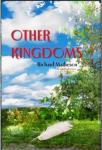Other Kingdoms
Richard Matheson
Gauntlet, 2011; $50.00
Signed, Numbered Edition
Review by William Simmons
Richard Matheson brought emotional maturity to the horror and fantasy genres, injecting supernatural premises and alienated characters with believability and psychological realism. Eliminating the gothic tropes of moldering castles and wind-swept moors for the instantly recognizable living rooms and kitchens of suburbia, Matheson enveloped his nightmares in the very heart of Americana. The gremlins, spirits and occult menaces populating his world, which is our world, disturb and astound precisely because they are treated as elements of an unseen yet nonetheless truthful aspect of our experience. His characters are often Everymen, as instantly recognizable as the next door neighbor. Outsiders alienated from society and themselves wage wars of conscience and altered perception that provide a metaphorical mirror of physical horrors. Other Kingdoms is an adult fable of sexual obsession and alternate realities that expands upon the author’s past thematic and stylistic preferences, combining elements of black magic and the faerie with a war veteran’s inner conflicts of self and family.
World War I veteran Alexander White seeks peace in the pastoral European village of Gatford. Enticed to seek refuge there by Harold Lightfoot, a war time friend killed in trench warfare, White expects a comfortable and prosaic atmosphere in which to reflect and rebuild his life. Instead he is thrust into a Wild Wood of faerie enchantment and sexual victimization. Renting a home near a lush, ancient forest, White becomes enthralled by the siren song of Magda, a seductive modern witch, and primal spirits whose existence shatter his preconceived notions of reality. Wandering into the woods despite warnings from locals, White encounters the Faerie, ancient nature spirits. An encounter that reveals an exhilarating and malevolent world interwoven within our own. Soon White is struggling not only for his life but his soul.
This dark fable of erotic darkness and ancient magic recasts several of Matheson’s favored themes with fresh vitality. White is a typical Matheson outsider severed from the world. Rootless and disillusioned by the war, he lacks family or friends. More crucial to the plot, he lacks faith or belief. Not a bad man by any means, White is a Matheson hero struggling to define himself and the world around him, which makes him more vulnerable to the ancient powers of the forest and sinister sexual agenda of a fem fatal. Matheson depicts a naturalistic reflection of the world which we think we all know and slips the supernatural into its falsely objective boundaries. Horror is evoked as much by the human characteristics of desire, greed, and rage as by the malevolent faerie and forces of black magic.
Matheson’s prose is lean and concise in its depictions of wonder and terror. This unadorned style lends fantastical moments admirable clarity and psychological realism, encouraging the suspension of disbelief so necessary in speculative fiction. Characters are real people with real emotional and spiritual wounds, and their dreams and desires sing true. Most impressive is the believability with which he treats the appearance and nature of the Faerie. A staple of human belief, the Faerie have been poorly explored in weird fiction. Arthur Machen’s horrifying little people and Algernon Blackwood’s elementals aside, few genre authors have chosen to delve into this rich and versatile mine of folklore. Matheson captures the Faerie in its rich symbolism and power to terrify. Gone are the cute pixies of Victorian England and Disney. The wild spirits threatening White are injected with the power, respect, and fear that was their original birthright. Neither completely apart from or a part of our world, these creatures are fearfully ambiguous. The human inability to truly know or identify them adds suspense and beauty to White’s desperate battle for survival.
Published as a mass market paperback in 2011 by Tor, the Gauntlet edition includes the author’s original unedited vision, including more graphic scenes of violence. Unfortunately, it is not without fault. Matheson’s Alexander White frequently refers throughout the narrative to his writing alter ego, Arthur Black, a horror pulp novelist which he becomes after the narrative. These too frequent asides, intended as humorous, disturb the flow and emotional depth of the story. They also reflect a disdain of the horror genre, which may resemble the author’s disenchantment with the tale of terror. Despite this irritation, the novel is a suspenseful reworking of mythic material whose telling is captivating, and its implications both tragic and poignant.









